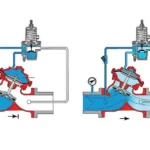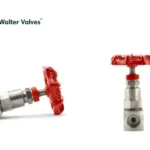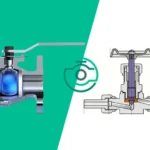Nos sistemas de fabricação industrial, o controle rigoroso e preciso dos processos de produção é essencial. As válvulas de instrumentação desempenham um papel fundamental na regulação do fluxo de fluidos e gases. Desde o isolamento e o estrangulamento até a ventilação e a prevenção de refluxo, elas garantem medições estáveis do processo e protegem os componentes de instrumentação.
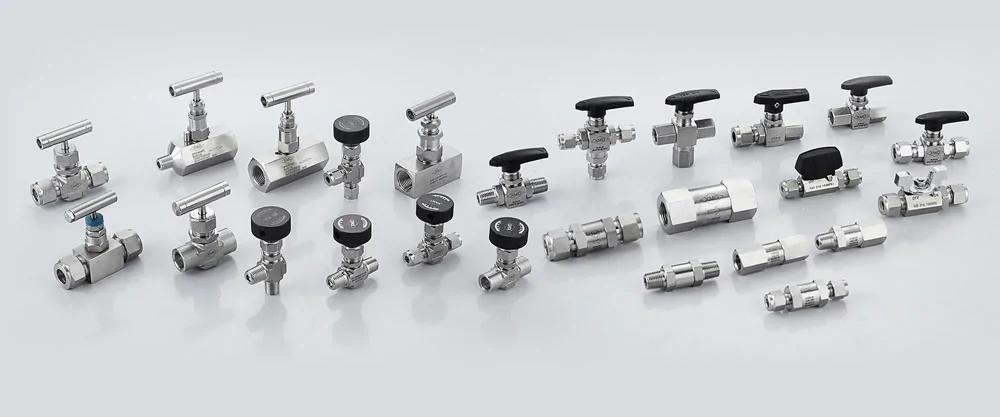
Há dez tipos principais de válvulas de instrumentação, cada uma projetada para aplicações específicas de controle e medição. Entre elas estão as válvulas de esfera, válvulas de agulha, válvulas globo, válvulas de retenção, válvulas manifold, válvulas de alívio, válvulas de ventilação, válvulas de bloqueio e sangria, válvulas de bujão e válvulas de diafragma. Cada válvula atende a funções distintas, como controle de fluxo, isolamento de pressão, prevenção de refluxo e ventilação segura.
Compreender os diferentes tipos de válvulas de instrumentação é fundamental para engenheiros, projetistas de sistemas e equipes de aquisição. A escolha do tipo errado pode comprometer a integridade do sistema e criar riscos à segurança.
O que é uma válvula de instrumentação?
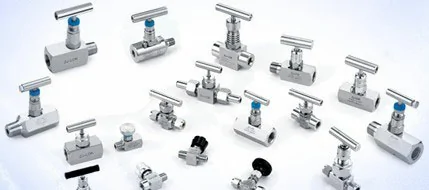
Uma válvula de instrumentação é um componente mecânico usado para controlar, isolar, regular ou redirecionar o fluxo de fluidos ou gases em um sistema de instrumentação. Diferentemente das grandes válvulas de processo, as válvulas de instrumentação são geralmente compactas e altamente precisas, o que as torna adequadas para aplicações que exigem alta precisão e resposta rápida.
Essas válvulas geralmente são instaladas perto de instrumentos de medição, como medidores de pressão, transmissores, medidores de vazão e linhas de amostragem. Elas são uma parte essencial dos sistemas de medição e controle, garantindo a precisão da instrumentação.
Por que classificar as válvulas de instrumentação é importante
A classificação das válvulas de instrumentação ajuda os engenheiros de sistemas e os compradores a tomar decisões informadas. Cada tipo de válvula tem um uso exclusivo - desde o controle preciso do fluxo de gás até a prevenção de refluxo ou o alívio do excesso de pressão.
O uso incorreto das válvulas pode levar a medições imprecisas, diminuição da eficiência do sistema ou até mesmo danos ao equipamento. Entender o tipo de cada válvula e como ela funciona ajuda os setores a manter a integridade do sistema, reduzir o tempo de parada para manutenção e otimizar os custos operacionais.
Principais tipos de válvulas de instrumentação
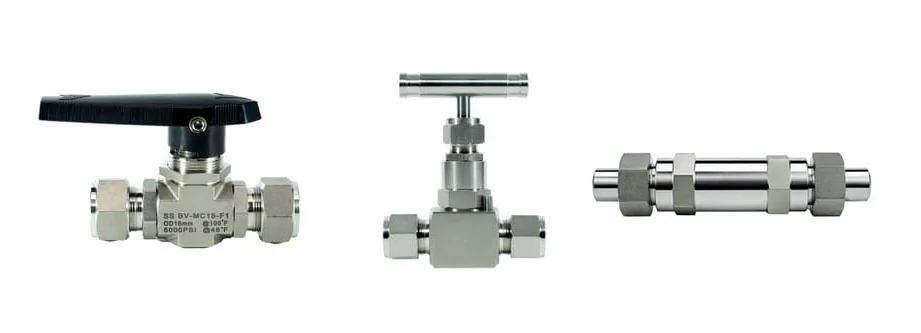
Válvulas de esfera
As válvulas de esfera são uma das válvulas de instrumentação mais comumente usadas devido à sua simplicidade e alta confiabilidade. Elas usam uma esfera oca giratória para controlar o fluxo. Quando o orifício da esfera se alinha com o tubo, o fluido flui livremente; quando girado 90 graus, o fluxo é interrompido.
Principais recursos:
- Operação rápida de um quarto de volta
- Baixa queda de pressão
- Durável e fácil de operar
Aplicações típicas:
- Isolamento de instrumentos de pressão
- Sistemas de amostragem
- Sistemas hidráulicos e de gás
Nossas válvulas de esfera são feitas de aço inoxidável resistente à corrosão, apresentam um corpo compacto e são testadas contra vazamentos para sistemas de alta pressão.
Válvulas de agulha
As válvulas de agulha são projetadas para o controle preciso do fluxo. Elas usam um êmbolo fino em forma de agulha que entra ou sai gradualmente de uma pequena sede para ajustar o fluxo com precisão.
Principais recursos:
- Controle fino da taxa de fluxo
- Ideal para aplicações de baixo volume e alta pressão
- Compacto e durável
Usos comuns:
- Linhas de calibração
- Instrumentos analíticos
- Amostragem de gases e líquidos
Nossas válvulas de agulha têm classificações de alta pressão, vedações de haste confiáveis e várias opções de conexão para instalações apertadas.
Válvulas globo
As válvulas globo regulam o fluxo por meio de um disco de movimento linear. Normalmente, são usadas em aplicações que exigem ajuste de fluxo em vez de controle de abertura/fechamento total.
Principais recursos:
- Excelente capacidade de estrangulamento
- Maior queda de pressão do que as válvulas de esfera
- Adequado para operações frequentes
Usado em:
- Loops de controle de pressão
- Sistemas de controle de temperatura
- Linhas de vapor e utilidades
Nossas válvulas globo são usinadas com precisão e construídas para uma longa vida útil, adequadas para aplicações de alta e baixa pressão.
Válvulas de retenção
As válvulas de retenção garantem que o fluido flua em apenas uma direção. Elas abrem sob pressão direta e fecham automaticamente sob pressão reversa para evitar refluxo.
Principais recursos:
- Operação passiva (não acionada)
- Evita contaminação e danos
- Disponível nos modelos de esfera e pistão
Aplicativos:
- Proteção contra refluxo de instrumentos
- Sistemas de distribuição de gás natural
- Bombas e compressores
Produzimos válvulas de retenção compactas e resistentes à corrosão, projetadas para desempenho confiável em ambientes desafiadores.
Válvulas do coletor
As válvulas manifold são válvulas de múltiplas portas usadas para isolar, equilibrar ou aliviar a pressão de dispositivos como transmissores de pressão diferencial. Várias válvulas (2, 3 ou 5) são combinadas em uma única unidade compacta.
Conjuntos de 2 válvulas: isolamento e ventilação
Conjuntos de 3 válvulas: isolamento, equalização e ventilação
Conjuntos de 5 válvulas: ventilação e isolamento adicionais para sistemas complexos
Aplicativos:
- Calibração do transmissor de pressão
- Instalação do medidor de vazão
- Painéis de distribuição de gás
Nossos manifolds são conhecidos por sua vedação estanque, design modular e fácil instalação, sendo amplamente utilizados nos setores de energia e químico.
Válvulas de alívio
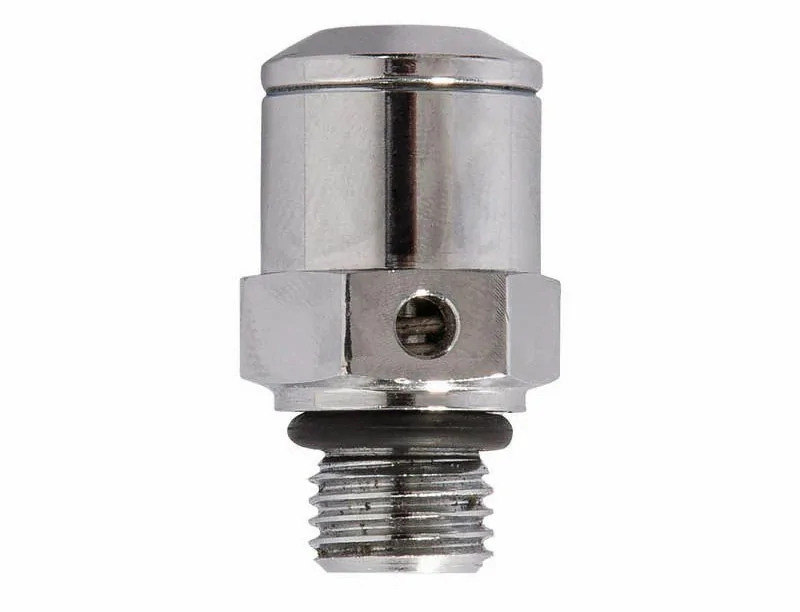
As válvulas de alívio são dispositivos de segurança que protegem os instrumentos contra a sobrepressão. Elas abrem em pressões predefinidas para liberar com segurança o excesso de mídia.
Principais recursos:
- Com mola ou acionado por diafragma
- Evitar falhas relacionadas à pressão
- Frequentemente exigido por normas de segurança
Usado em:
- Painéis de gás
- Reguladores de pressão
- Sistemas de injeção de produtos químicos
Nossas válvulas de alívio são calibradas e testadas na fábrica com ajustes precisos de pressão para evitar desligamentos desnecessários do sistema.
Válvulas de ventilação
Essas válvulas controlam a liberação de pressão ou ar preso nos sistemas de instrumentação.
Funções:
- Ventile os gases com segurança antes da desmontagem
- Remova as bolsas de ar residuais
- Manutenção dos sistemas de drenagem
Aplicativos:
- Calibração de instrumentos
- Procedimentos de desligamento
- Pressurização de frascos de amostra
As válvulas de respiro da Walter Valve são robustas e apertadas manualmente para operação sem ferramentas.
Válvulas de bloqueio e sangria
Essas válvulas especializadas permitem tanto o isolamento (bloqueio) quanto a liberação segura da pressão (purga) em uma única unidade.
Benefícios:
- Maior segurança na manutenção
- Redução da necessidade de várias instalações
- Economiza espaço e tempo de instalação
Usos:
- Transmissores de pressão
- Sistemas de monitoramento de fluxo
- Equipamento montado em skid para petróleo e gás
Os projetos de bloqueio e sangria da Walter Valve são compactos, resistentes à corrosão e altamente confiáveis.
Válvulas de plugue
As válvulas de plugue são frequentemente usadas em aplicações de baixa pressão. Elas usam um plugue cilíndrico ou cônico para proporcionar um controle rápido e preciso.
Vantagens:
- Restrição mínima de fluxo
- Tamanho compacto
- Operação rápida
Usado para:
- Coleta de amostras
- Operações de desligamento não críticas
Válvulas de diafragma
As válvulas de diafragma usam uma membrana flexível para controlar o fluxo. Elas são ideais para aplicações estéreis, corrosivas ou de polpa em que a limpeza é fundamental.
Benefícios:
- Zero vazamento atmosférico
- Fácil de limpar e higienizar
- Sem cavidades internas
Indústrias:
- Produtos farmacêuticos
- Biotecnologia
- Processamento de alimentos
Oferecemos opções de válvulas de diafragma personalizadas para aplicações especiais que exigem alta resistência química e à higiene.
Materiais e variantes de conexão
Nem todas as válvulas são iguais. É por isso que oferecemos:
- Opções de materiais: SS304, SS316, Monel, latão, Hastelloy e muito mais
- Tipos de conexão: Rosqueada (NPT/BSP), soldada, flangeada, compressão (conexões OD)
Cada configuração é adaptada à pressão do sistema, à compatibilidade de mídia e ao espaço de instalação.
Soluções em válvulas Walter:
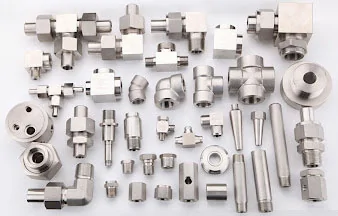
Acessórios especializados para válvulas e personalização Acessórios para válvulas
A Walter Valve fabrica uma variedade de acessórios para válvulas, incluindo:
- Adaptadores
- Conexões de compressão
- Alças de travamento
- Conectores de tubo
Esses componentes garantem uma integração suave e segura em sistemas mais amplos e estão em conformidade com as normas ISO, DIN e ANSI.
Como a Walter Valve atende às demandas do setor
A Walter Valve fornece soluções B2B diretas da fábrica para setores que exigem válvulas de instrumentação duráveis e de alta precisão. Nossos principais pontos fortes incluem:
- Preço de fábrica: preços competitivos no atacado
- Amplo estoque: principais tipos de válvulas em estoque
- Prazos de entrega curtos: resposta rápida para pedidos urgentes
- Engenharia personalizada: configurações de válvulas sob medida, mediante solicitação
Atendemos clientes globais e nacionais nos setores de geração de energia, petróleo e gás, petroquímica, tratamento de água e manufatura.
Conclusão
De válvulas de esfera e agulha a válvulas de alívio, ventilação e manifold, as válvulas de instrumentação são essenciais para todos os sistemas de controle e monitoramento. Elas ajudam a manter a precisão da medição, garantem a segurança operacional e melhoram a eficiência do processo.
Compreender os diferentes tipos de válvulas e quando usar cada um deles é fundamental para otimizar o projeto do sistema.
Como fabricante B2B confiável, com uma longa história na produção de válvulas de instrumentação, a Walter Valve oferece não apenas uma ampla linha de produtos, mas também orientação técnica, engenharia personalizada e entrega pontual para atender às necessidades em evolução da indústria moderna.
Chamada para ação
Pronto para atualizar seu sistema de instrumentação?
Contato info@waltervalves.com agora para obter catálogos, consultoria técnica ou preços de atacado para seu próximo projeto.
Deixe a Walter Valve ser seu parceiro de confiança no controle preciso de fluxo.

